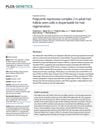 8 citations,
May 2021 in “Bioengineering & translational medicine”
8 citations,
May 2021 in “Bioengineering & translational medicine” Hair growth environment recreated with challenges; stem cells make successful skin organoids.
 8 citations,
April 2020 in “Journal of Ethnopharmacology”
8 citations,
April 2020 in “Journal of Ethnopharmacology” Herbs might help with hair loss, but more research is needed to confirm their safety and effectiveness.
 8 citations,
April 2020 in “Facial Plastic Surgery Clinics of North America”
8 citations,
April 2020 in “Facial Plastic Surgery Clinics of North America” Minoxidil, finasteride, and low-level laser light therapy are effective FDA-approved treatments for hair loss.
 8 citations,
January 2020 in “Skin Pharmacology and Physiology”
8 citations,
January 2020 in “Skin Pharmacology and Physiology” Caffeine improves hair growth, thickness, and reduces shedding.
 8 citations,
January 2013 in “The scientific world journal/TheScientificWorldjournal”
8 citations,
January 2013 in “The scientific world journal/TheScientificWorldjournal” Human hair follicles may provide a noninvasive way to diagnose diseases and have potential in regenerative medicine.
 8 citations,
January 1996 in “Springer eBooks”
8 citations,
January 1996 in “Springer eBooks” Male pattern baldness may be caused by factors like poor blood circulation, scalp tension, stress, and hormonal imbalances, but the exact causes are still unclear.
 8 citations,
October 1988 in “Clinics in Dermatology”
8 citations,
October 1988 in “Clinics in Dermatology” Current research explores hair growth drugs, while future research aims for personalized treatments.
 7 citations,
July 2020 in “Pigment cell & melanoma research”
7 citations,
July 2020 in “Pigment cell & melanoma research” RT1640 treatment reverses gray hair and promotes hair growth in mice.
 7 citations,
January 2013 in “BioMed research international”
7 citations,
January 2013 in “BioMed research international” Hair follicles and deer antlers regenerate similarly through stem cells and are influenced by hormones and growth factors.
 7 citations,
December 2008 in “Expert Review of Dermatology”
7 citations,
December 2008 in “Expert Review of Dermatology” The document concludes that various childhood hair and nail disorders exist, some may improve on their own, and advances in genetics and immunology could enhance treatment and counseling.
 7 citations,
February 2012 in “Facial Plastic Surgery”
7 citations,
February 2012 in “Facial Plastic Surgery” The mini-lift is a less invasive face-lift for younger patients that is quicker, cheaper, and has a fast recovery, but is less effective for the midface and excessive neck skin.
 6 citations,
December 2021 in “PLoS Genetics”
6 citations,
December 2021 in “PLoS Genetics” Polycomb Repressive Complex 2 is not needed for hair regeneration.
 6 citations,
March 2021 in “Journal of Cosmetic Dermatology”
6 citations,
March 2021 in “Journal of Cosmetic Dermatology” PRP injections promote hair growth and increase hair density in androgenic alopecia.
 6 citations,
February 2017 in “Case Reports in Dermatology”
6 citations,
February 2017 in “Case Reports in Dermatology” Hair loss led to the diagnosis of Cushing's disease in a patient, showing that hair loss can be a sign of hormonal disorders.
 6 citations,
April 2010 in “Journal of Dermatological Science”
6 citations,
April 2010 in “Journal of Dermatological Science” Laminin-511 may help promote hair growth, while laminin-332 does not affect hair loss.
 6 citations,
July 2003 in “Journal of Womens Health”
6 citations,
July 2003 in “Journal of Womens Health” Experts say proper treatment and sensitivity are important for women's facial skin issues like acne and unwanted hair.
 6 citations,
October 1997 in “CNS Drugs”
6 citations,
October 1997 in “CNS Drugs” Psychotropic drugs can cause hair loss or excessive hair growth.
 5 citations,
March 2020 in “Journal of Cosmetic Dermatology”
5 citations,
March 2020 in “Journal of Cosmetic Dermatology” High concentration Minoxidil and Carboxygas effectively treated resistant hair loss with no side effects.
 5 citations,
January 2019 in “Skin appendage disorders”
5 citations,
January 2019 in “Skin appendage disorders” The conclusion is that it's important to tell apart alopecia areata from lipedematous alopecia for proper treatment, as alopecia areata can be reversed.
 5 citations,
January 2013 in “Cells Tissues Organs”
5 citations,
January 2013 in “Cells Tissues Organs” Activin B helps start and grow hair follicles in mice.
 4 citations,
December 2019 in “Journal of Cosmetic Dermatology”
4 citations,
December 2019 in “Journal of Cosmetic Dermatology” Thread monofilament and minoxidil together increase hair growth in female androgenetic alopecia.
 4 citations,
May 2004 in “Facial Plastic Surgery Clinics of North America”
4 citations,
May 2004 in “Facial Plastic Surgery Clinics of North America” Hair transplantation helps women with hair loss; understanding and empathy lead to happy patients.
 3 citations,
October 2022 in “PloS one”
3 citations,
October 2022 in “PloS one” Scientists have developed a method to keep chicken feather follicles alive and structurally intact in a lab for up to a week.
 3 citations,
July 2018 in “JAAPA”
3 citations,
July 2018 in “JAAPA” Some birth control pills can cause hair loss, and switching to ones with less androgen should help.
 3 citations,
June 2006 in “Expert Review of Dermatology”
3 citations,
June 2006 in “Expert Review of Dermatology” The document concludes that hair loss is complex, affects many people, has limited treatments, and requires more research on its causes and psychological impact.
 2 citations,
January 2013 in “Elsevier eBooks”
2 citations,
January 2013 in “Elsevier eBooks” The document explains the genetic causes and characteristics of inherited hair disorders.
 1 citations,
April 2024 in “Journal of Pharmaceutical and Pharmacological Sciences”
1 citations,
April 2024 in “Journal of Pharmaceutical and Pharmacological Sciences” The mouse models are effective for testing new hair loss treatments.
 1 citations,
November 2023 in “Naunyn-Schmiedeberg's archives of pharmacology”
1 citations,
November 2023 in “Naunyn-Schmiedeberg's archives of pharmacology” Henna has potential health benefits and can treat various conditions, but more research is needed to confirm safety and effectiveness.

Minoxidil helps stimulate hair growth and enlarge small follicles in common hair loss, but doesn't stop it, and its effects can be boosted when combined with finasteride.
 1 citations,
October 2012 in “Medical Hypotheses”
1 citations,
October 2012 in “Medical Hypotheses” The conclusion suggests that treatments targeting root causes of chronic diseases may be developed by focusing on gene expression and lifestyle factors.






























